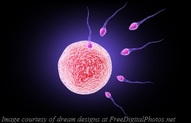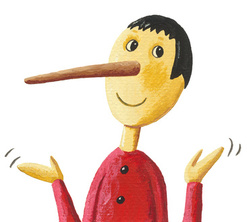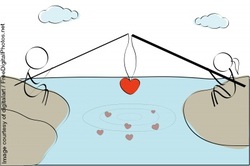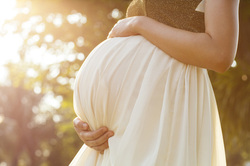 Trying to conceive? Here's a top tip for getting pregnant from the Lothian Reflexology Fertility Programme ... The most important thing if you want to get pregnant is to have sex before or during ovulation. Obvious, right! But how to do that accurately? And what if you're timing is accurate but you're still not getting pregnant, or, sadly, you miscarry? And what if you're going for tests or procedures - the more information you can provide, the better, right? You'll know, if you're TTC, how the uncertainty can drive you mad - constantly feeling as if you're second guessing your cycle. And you might be going for treatments or following certain programmes to improve fertility without knowing whether they're really making a difference. Information gives you power, even if it's unwelcome information. So what's the answer? Temperature Charting is essential if you want to know what's happening with your cycle. Your basal body temperature is one of the two primary indicators of your fertile window, but it gives a lot more information than that. Temperature charting can tell you when you ovulate - unfortunately it tells you after you have ovulated, and that can put a lot of women off using it - why bother? Well, if you continue with your charting for a few months, you may be able to see a pattern. Using an ovulation predictor kit? Charting your temperature you can help you check the accuracy of the ovulation predictor kit against the information about your ovulation from your chart. Your temperature chart will also give you information about your hormone cycle and if it's clear you're ovulating regularly and having sex at the right time then, if you've been trying for a while, there may be other issues. Temperature charting will indicate progesterone deficiencies in the second half of the cycle which can be associated with infertility and early miscarriage. Not great news, but at least you have some information and can take action sooner rather than later. And if you're following a programme to improve your fertility such as acupuncture or Fertility Reflexology then temperature charting gives you an indication of whether the programme is working or not. It may not be totally scientific, but it is more concrete than a wing and a prayer. The Lothian Reflexology Fertility Programme recommends temperature charting, not as a fertile window predictor (although that's another benefit), but rather as an information gathering tool about a woman's individual cycle and hormone levels. Over a 12 week fertility programme, the client can see for themselves any positive changes to their cycle and hormone levels and that helps to take away some of the uncertainty and lets the client feel more in control. Temperature charting is not mandatory, but it comes highly recommended for the Lothian Reflexology Fertility Programme. Want to know more? Download the Fertility Reflexology E-Book. If you want more information about fertility charting or you want to start temperature charting for yourself, the best free resource is www.fertilityfriend.com. Any questions or experiences with temperature charting? I'd love to hear about them, so please post a comment.
4 Comments
 If a couple are unlucky enough to be referred for fertility testing - and that's about 1 in 6 of couples - there tends to be a fairly relaxed approach to male fertility testing. After all, with IVF or ICSI procedures, it only needs one sperm to fertilise the egg. But if the sperm is damaged, then fertilisation may not occur. It's estimated that at least 30% of fertility difficulties lie with the man alone and yet male fertility testing is still relatively basic. Normally male fertility testing looks at 3 factors - volume, motility and morphology - there needs to be enough sperm, that are moving in the right direction and are well formed. And the good news is that sperm quality can be improved by lifestyle factors: a healthy diet which is low in sugar and processed foods, vitamin supplements, regular sex, keeping the genitals cool and avoiding alcohol, smoking and any other toxic substances. But can more be done to test for sperm quality? Yes. The SpermComet test is a more sensitive test designed to measure DNA damage in individual sperm. There are a couple of instances in which a more in-depth testing of male fertility factors can be helpful: IVF/ICSI When undertaking assisted reproductive techniques it can be useful to know about the quality of sperm in order to select the technique which has the best chance of success. For example, if a test shows moderate sperm DNA damage, IVF may to the way to go, whereas a test result with higher DNA damage may indicate that going directly to ICSI will offer the best chance of a pregnancy. Recurrent Miscarriage Sadly miscarriage is something that about 1 in 4 women will experience, and where there is recurrent miscarriage a sperm DNA test may provide useful information. There can be a number of reasons for recurrent miscarriage, one of which is sperm DNA quality. And according to Lewis Fertility Testing who designed the sperm comet test, "Recurrent miscarriage following IVF or ICSI can be caused by sperm DNA damage." So, if you've experienced recurrent miscarrige, or are about to embark on assisted reproductive techniques, or if time is running out and you want as much useful information about your fertility as you can gather, then a SpermComet test might be useful. Testing is available in Edinburgh and if you'd like to know more, contact Doris Wylie on 07724 197627. And for more general information on fertility click here and discover how reproductive reflexology can help support your fertility journey.  "We are lucky to get half the nutrition our parents and grandparents did in the Fifties and Sixties," said Amanda Williams, managing director of Cytoplan, a UK distributor of the "food-state" supplements in an article in The Independent today. Over the last 60 years the food chain has changed out of all recognition, becoming industrialised and chemicalised, and causing depletion of the nutrient levels in the soil. This, combined with an increasing trend towards food production becoming more and more processed, makes it ever more difficult to be sure that our food is providing all the nutrients we require. Our body is designed to live on fresh fruit and vegetables and the more natural the food, the greater the benefit it provides to the body. We need our food to provide essential vitamins and minerals or we need to find alternative sources of these essential elements to good health in the form of supplements. But are supplements all they’re cracked up to be? Most vitamin supplements are synthetic and as such may have limited benefits: they do not contain the complex mixture of factors that are available from nature, and may also contain fillers or binders and artificial flavourings. Some claim that these synthetic vitamin supplements act as free radicals in the body increasing toxicity. The best way to top up your mineral and vitamin reserve is through a varied diet, high in (organic) fresh fruit and vegetables, white meat and whole grains, but if you feel you need a supplement, then seek out food-state supplements. These are nutrients which are combined with other appropriate food bases to ensure they come complete with the phytonutrients and associated food factors that are necessary for optimal absorption and use in the body. The advantages of this more natural approach to supplements are: 1. They are easy for the body to absorb because the particles are smaller 2. They are more effective because they provide nutrients in a state as close as possible to food 3. They avoid increasing the toxic load on the body because they contain no GMO materials, synthetic chemicals, fungicides or herbicides And if you’re trying to conceive, it’s important to get all the vitamins and minerals you need to improve fertility, in as natural a way as possible. Looking for suppliers? Just Google food-state supplement suppliers, but be warned, they're expensive, very expensive! MAXIMISE YOUR FERTILITY, NATURALLY Your body naturally strives to be in a state of balance and it's constantly adjusting to maintain that state of balance: your breathing, temperature, blood pressure, blood volume, fluid levels, cell life cycles, hormone levels and a multitude of other adjustments are being made by your body every minute. This balance is created from a dynamic process that responds to internal and external factors: what you eat, your level of physical activity, stress, environmental pollution, and a whole range of factors. And your body needs to be in balance with your mental and emotional state - thought patterns and emotions have a physical impact – your thoughts and feelings can affect posture and chemical responses in the body: the stress response is a great example of how mind and emotions can affect physical state. So here are a few ways to maximise your fertility, naturally: Eat Naturally When it comes to diet, go for organic, unprocessed, colourful food. If possible, cook from scratch to avoid additives, and have a wide variety of food. Avoid white or grey foods such as white bread, pasta and rice and avoid diet foods as they are likely to contain artificial sweeteners such Aspartame. Cut out crackers, pastries, cakes and chocolate as they are likely to contain transfats which are linked to lower fertility and avoid products with MSG such as chinese meals, flavoured crisps, meat seasonings and packaged soups. Live Naturally Alcohol, caffeine, smoking, recreational drugs, and unnecessary medications are all no no's. Avoid stress or develop powerful coping strategies to deal with stress - try meditation to help detox the mind and take the edge off negative mindsets. Exercise Gently Avoid the gym and excessive exercise (long runs, rows, etc). Walking is great exercise and extremely beneficial, especially if you walk in a natural environment. Go for natural forms of exercise such as yoga and if possible find a fertility yoga class. Muscle building exercise diverts testosterone from the reproductive organs to the muscles. Avoid cycling and swimming. Ensure A Natural Environment Check your house for cleaning products - many of these contain toxic chemicals. Many of these chemicals were tested in the 1950's and 60's and not in the more stringent health criteria that exist today. Try cleaning your house with lemon juice and baking of soda or buy natural products from your health food store. If you feel like being a bit more creative, you can go online and discover how to make your own cleaning products. And that goes for beauty and personal care products for hair, body and personal hygiene. Check online to see if you can find more natural versions of your beauty and personal care products. Laptops should not be kept on laps and mobiles should not be kept in pockets - they give off low levels of radiation. If possible avoid low level radiation from TV, VDU, digital clocks and electric blankets and avoid living near pylons, radio stations/masts, phone exchanges for the same reasons. Live A Natural Lifestyle Be creative - draw or paint, sew, bake, write or do whatever you do to get your creative juices going. Being creative connects mind, body and emotion to your desire to create a baby. Look at your life and strip it back to the bare essentials. Look at your life and how you spend your time and ask yourself whether it gives you joy or if it's just there to fill in the time. Go for joy! To help you work your way through this more easily, write down a list of all the things you'd like to do to establish a more natural lifestyle. Then work out what are the three easiest things to do and do them. Then work out what are the three most impactful things and work out a plan for implementing them. Then knock of the rest of the list at a rate of three items a week. I hope you have joy in living a more natural life and maximising your fertility, naturally.  Hello, I’d just like to check in with you today and ask ... what big fat lies are you telling about the future? Because telling big fat lies about the future is fine, it’s really quite OK, in fact it’s desirable – IF THEY’RE THE RIGHT BIG FAT LIES. Am I mad I can hear you thinking! Why am I talking about big fat lies and the future? Well, because, when you think about it, THE FUTURE DOESN’T EXIST. It’s not happened yet. It hasn’t arrived. And the past has gone, never to return. The past consists of memories (not all of which, by the way, are always as accurate as you store them – so your past may be full of lies also, but that’s for another day). So, if the past and future don’t exist, then the future is a blank slate, it’s an empty space a void a place we are travelling to but have not yet arrived at. And our natural tendancy is to fill that empty space, that void, with conjecture of what it might be – in other words, lies. Anything and everything you say about the future is A BIG FAT LIE. So when you look at your future what do you see - what big fat lies are you telling yourself about the future? Are your big fat lies, positive or negative? Are they scary or exciting? Sad or happy? Optimistic or pessimistic? And how real do they seem to you? Do you really believe your big fat lies? Because the more you believe your big fat lies, the more likely they are to come into being – you’re programming your brain to seek and find these big fat lies and bring them into your life. So, I’d like to ask: if everything you say about the future is a lie, a big fat lie, is your big fat lie positive, hopeful and helpful, taking you where you would love to be, or is your big fat lie, negative, pessimistic and useless, taking you away from where you would love to be? If everything you say about the future is a lie, a big fat lie, won’t a big fat positive lie, make you feel more positive and hopeful now? And that might be a good thing, because NOW is the only moment you really have. And a big fat positive lie about the future might actually help programme your brain to create that future for you. So, please feel free to tell big fat POSITIVE lies about the future. Dream of what you want, rather than what you don’t want: it will help you feel better now and it might even help you create that future you dream of. Maximise your fertility, naturallyHave you been trying to conceive for 12 months or more, without success?
Are you confused by all the conflicting information on the internet? Would you like to feel more supported with your efforts to get pregnant? Fertility Support Workshops
Sign up for a series of 6 Fertility Support Workshops: Only 10 places available When: Mondays 7.30-9pm on: 22 Sept, 6 Oct, 20 Oct, 3 Nov, 17 Nov, 1 Dec 2014 Where: The Sir Arthur Conan Doyle Centre 25 Palmerston Place, Edinburgh How Much: £15 per session Book: Contact Doris Wylie on 07724 197627 or email [email protected] Doris Wylie Lothian Reflexology www.lothianreflexology.co.uk 07724 197627 www.facebook.com/lothianreflexology  If you'd like to conceive, I'd ask you to look at all the highs and lows of your fertility journey. I know you'd do anything to get pregnant, so I'd like you to ask yourself ... are you trying too hard? Trying might not be a useful thing to do, in fact it may actually hinder all your best efforts, because trying is about : endeavour, difficulty, becoming annoyed – or so the dictionary says. Trying is all about chasing after your dream rather than waiting to receive it. Trying is all about forcing your heart's desire into being rather than allowing it to materialise in it's own good time. Trying is about control rather than being in a state of flow. Are you chasing your dream of having a baby rather than being ready to receive with open arms? May I suggest that this might not be the best strategy. And here’s why ... Imaging you were to go fishing. If you were to go fishing, you’d pack your kit – everything you need to land that prizewinning fish. You’d pick the perfect spot where you know the fish are likely to be. You’d set your bait and cast your line and then you’d sit back and relax and wait for the fish to bite. And while you’re waiting for the fish to bite you’d likely just enjoy being out in the fresh air, in the peace and quiet, giving yourself time to settle and release, and letting your worries and cares wash away. What you wouldn’t do is: jump into the car with no equipment. Then stop at any old spot without checking first to find out how the fishing was. And race into the water fully clothed, trying to catch the fish with your bare hands! That would just be ridiculous, wouldn't it? The very act of “trying”, creates a level of stress that is more likely to take you away from what you want instead of closer to it. You effectively create obstacles that wouldn’t otherwise exist as a consequence of your desire to increase your chances of getting pregnant. You begin to get in your own way! Can I just say that again, "You begin to get in your own way"! This is not always an easy concept to process when your sole goal in life is to get pregnant, so please give it some thought. May I suggest that you might choose to let go, stop "trying", chill and just wait for the fish to bite. And if you need some help with your fertility journey, check out how Fertility Reflexology could help. If you want more tips like this, you’ll find them in the Free Baby Making Mindset Club, just go to https://www.facebook.com/groups/1422257428013810/  I discovered this article entitled "Is Reflexology The New Cure For Infertility" when I was looking for inspiration for this week's blog. It's by ANDREA PERRY, @ femail.co.uk. I'm not being lazy, honestly, I've copied and pasted the article, because for me, it's very topical. In another two weeks I'll be attending Part I of a ReproReflexology training course, which will give me a much more in-depth insight into Reflexology for fertility, building on the skill base that my previous 3 Fertility Reflexology courses have provided. I'm really looking forward to the course I'm hoping it will live up to my high expectations. I'll be looking for lots of practice after the course, so if you know anyone who might want to try Reflexology for fertility issues, please spread the word. And they don't need to take my word for it, this article gives a pretty good overview. It reads: "Infertility can be an emotionally exhausting, not to mention expensive, condition. But according to a growing number of people, the key to overcoming the problem for many couples could be far simpler than they think - thanks to reflexology. An increasing number of women claim this popular type of foot massage has helped them conceive. Now a medical study has been launched to discover if the claims are true. Reflexology, a traditional healing art dating from the ancient Egyptians and Chinese, involves manipulation of pressure points in the hands and feet and is often used to ease period pain, headaches, sinus and back problems as well as the effects of chemotherapy. Practitioners claim the soles of the feet are like a mini map of the inside of the body and are linked to our inner organs and systems, including the fallopian tubes and ovaries. By massaging different points on the feet therapists claim they can unblock energy pathways in the body and so help the body to regain its natural balance and heal itself. Some points on the foot are associated with a woman's egg production and by manipulating these areas reflexologists claim they can correct the imbalances which can hamper pregnancy. The latest research, a two year clinical trial at the IVF unit at Derriford Hospital in Plymouth, is the brainchild of reflexologist Jane Holt. She approached the unit after 13 of the 23 women she treated with a range of fertility problems fell pregnant last year. Beccy Wellington, 34, an auxiliary nurse, from Kingsbridge, in Devon, is convinced that her trip to see Jane in November 1999 resulted in the birth of her son Luke, who is now five months old. 'We had been trying for a baby for just over a year and had begun to look at other ways that would help me conceive when someone recommended reflexology,' she said. 'I had four treatments and was pregnant within three weeks. I am convinced that the reflexology got my body in working order so I was ready to conceive. I also felt ten times better, more positive and a lot happier in myself.' 'I went in there with an open mind, but was totally shocked to find myself pregnant so soon,' she said. 'I would definitely advise other women to try reflexology. It may not work for everyone, but it worked for me and it is worth trying.' Jane Holt, a reflexologist for 12 years, claims one woman she helped had been trying to get pregnant for 20 years. 'Infertility is a complex problem and I think that often what is needed is something that gives the system a bit of a kick start and that's what reflexology can do,' she said. 'At least this gives women the option to try something else while they are going through hospital procedures and even if it works for some of them that's a bonus.' Cathy Shipton, who plays nurse Duffy in the BBC TV series Casualty, is also convinced that reflexology on the set of the show in Bristol helped her to become pregnant. She had been trying to have a baby for four years, but four months after having twice weekly reflexology sessions she became pregnant. In the new study, 150 volunteers will be offered reflexology rather than the fertility drug clomifene, which is usually used to induce ovulation. This drug works in about 70 per cent of patients, but the drug's main drawback is it can increase the likelihood of a multiple pregnancy. The volunteers will each receive eight treatments over a two to three month period. In order for the trial to be conducted in a scientific way, patients and hospital staff will not know whether true reflexology or a 'dummy' version has been given. Only the reflexologist will know who has had the real treatment. One in seven couples suffers with infertility. Last year the Plymouth IVF unit saw over 900 patients. Thirty per cent of these were not producing eggs. The hospital has already pioneered the use of acupuncture - the insertion of fine needles into the body to unblock energy channels - in pregnancy and routinely offers it to women who might benefit. Dr Jonathan Lord, clinical lecturer in reproductive medicine at the hospital, is co-ordinating the new trial. 'At the moment there is no evidence to say whether reflexology works or not,' he said. 'Although there are several reports of patients in whom it has worked, this is not sufficient evidence to enable it to be routinely recommended.'" http://www.dailymail.co.uk/health/article-20980/Is-reflexology-new-cure-infertility.html And talking about the benefits of Reflexology, I'd just like to remind you that I have a special JULY OFFER: £10 off your first treatment of Reflexology or Indian Head Massage, so please help me spread the word. This offer is only available for treatments booked in July, so don't delay. To book just call Doris on 07724 197627. If you've never tried Reflexology and don't know what it is, here's a brief rundown:
What is Reflexology?
How does Reflexology work? Reflexology uses finger pressure on the feet to relax and re-balance the whole person in mind, body and emotion. It works on the principle that various parts of the feet relate to corresponding parts of the body and that by working on the feet the Reflexologist can create a balancing effect. The finger pressure on the feet is firm, so it should not feel tickly. Who can benefit from Reflexology? Anyone can benefit from Reflexology: from newborn babies to those receiving end of life care, and anyone in between, but it is particularly beneficial for anyone who is experiencing ill-health and in particular those suffering from stress or stress related illnesses. There may however be times when it is not appropriate to provide a treatment, so if you're not sure, do ask. Reflexologists often specialise in particular areas, such as: fertility, pregnancy, babies, children, ageing well, pain relief, sleep, stress, cancer care, and end of life care. What happens in a Reflexology treatment? The Reflexologist will take a few moments to gather information about the client's condition (it tends to take a bit longer for the first treatment), and then the client is made comfortable, lying on a special chair or massage table. It's possible to chat during the treatment, but it's more relaxing to just close your eyes and enjoy the experience. It's not uncommon for clients to drift off into a light doze. How will I feel after a treatment? Well, everyone is different, but generally clients will feel deeply relaxed after a treatment. Clients often report having had a good night's sleep and a boost in their energy levels after a treatment. Really the only way to know is to give the treatment a try. There have been some positive research projects carried out with reflexology; however, as yet, there is not a large enough body of evidence to make clinical claims of effectiveness. With ever increasing levels of stress in everyday life, it is important for people to take more responsibility for their own healthcare needs. Reflexology may be one of the ways to mitigate the stresses of modern life. Reflexology should not be used as an alternative to seeking medical advice. The only way to know if Reflexology will be beneficial for you is to give it a try. If you're ever feeling stressed or a bit out of sorts, think about having a Reflexology treatment to get you onto more of an even keel. To make the decision easier, I offer £5 off your first treatment. This applies to everyone, so you don't need a special voucher or ticket, it is just automatically applied when you pay for your treatment. For July, I'm offering an extra £5 off to all new clients. That means you get £10 off your first treatment if you book in July. But this offer only applies to July 2014, so don't delay, book your treatment today by calling Doris on 07724 197627, or email [email protected]. |
|

